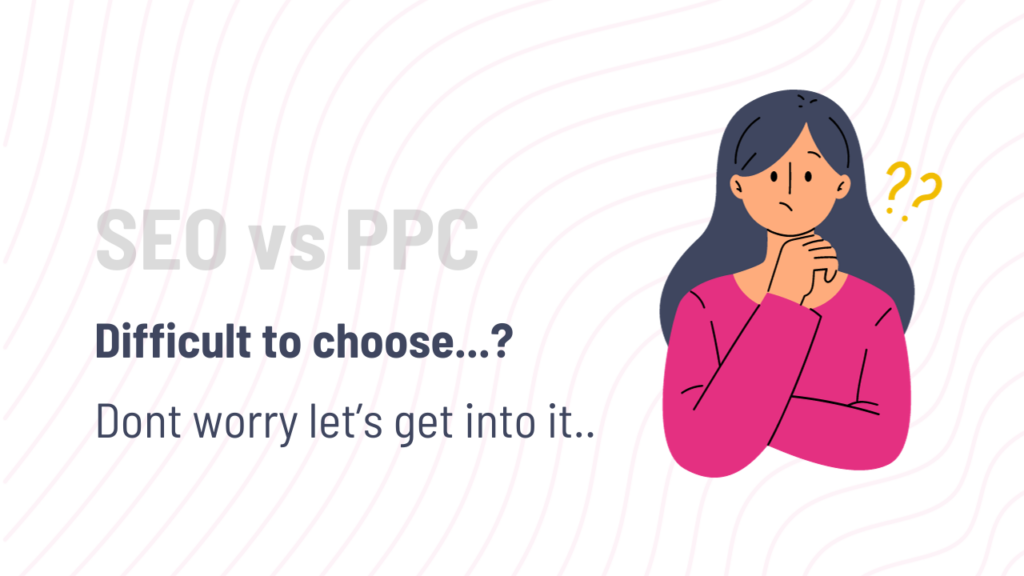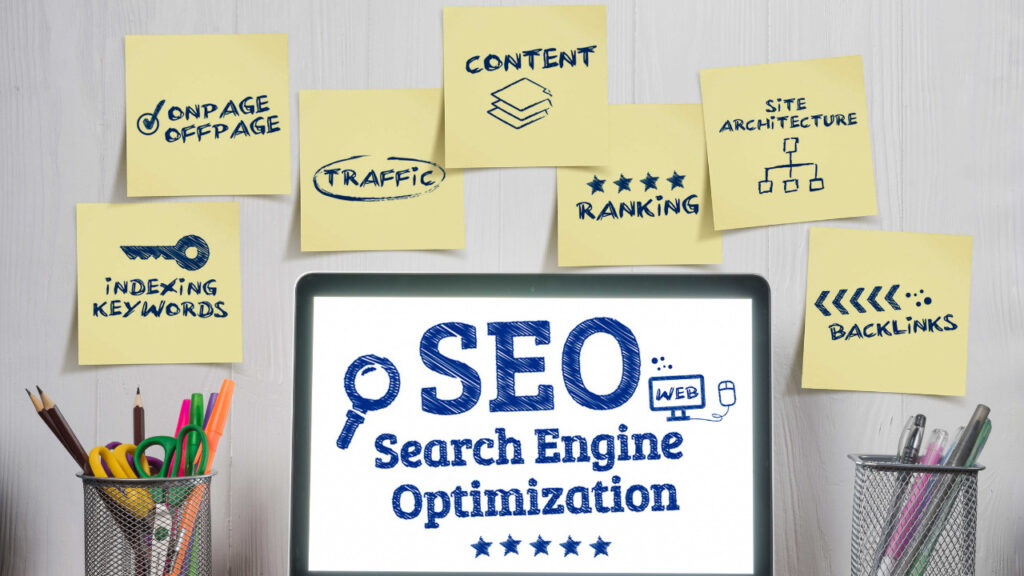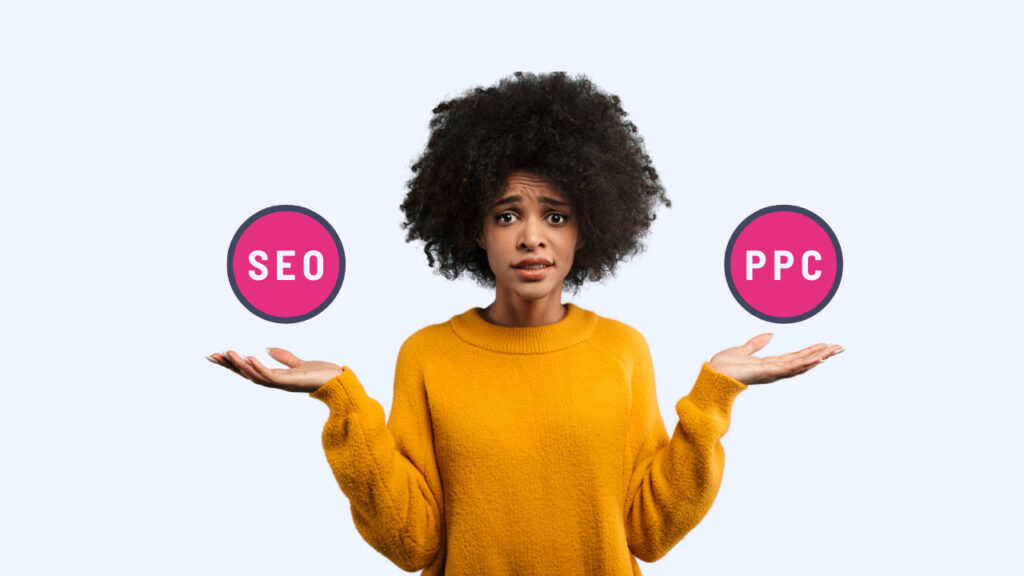
Hey there, fellow marketers and business owners! Are you struggling to decide between Search Engine Optimization (SEO) and Pay Per Click (PPC) for your brand’s online visibility?
Well, you’re in the right place! In this blog post, we’ll dive deep into the age-old debate of SEO vs PPC to help you determine which strategy is the best fit for your unique brand.
Whether you’re aiming for long-term organic growth or seeking immediate results through targeted ads, we’ve got you covered.
Let’s explore the ins and outs of both approaches and find the perfect match for your brand’s online success!
How does SEO differ from PPC?
Before we delve into the fascinating world of SEO and PPC, it’s crucial to compare and contrast these two traffic-generating powerhouses. So, what exactly are SEO and PPC? How are they different and why does it matter? Fret not, you’re about to get a clear-cut insight into these powerful digital marketing strategies.
Search Engine Optimization (SEO)

On one side, we have Search Engine Optimization (SEO), an organic way of boosting the visibility of a website in search engine results. Imagine you have a shop, and subtly, thoughtfully, you place signs and simple directions to guide potential customers to your store. Boom, that’s SEO for you, at least metaphorically. It’s a game of strategy, patience, and understanding how search engines work.
PPC (Pay Per Click)
Opposite to SEO, we have Pay-Per-Click (PPC). This is more like paying for a massive billboard on the busiest highway – it’s faster and more direct. PPC is a model of internet marketing where advertisers pay a fee each time their ad is clicked. In essence, you’re buying visits to your website, instead of attempting to earn those visits organically.
While both aim to drive traffic to your website, they differ in their approach. SEO requires ongoing optimization and content creation to improve site ranking over time, generating organic, ‘free’ traffic.
On the other hand, PPC offers almost immediate results, but at a cost. Each click comes with a price tag. Balancing these two strategies can create a powerful, synergistic digital marketing campaign.
What are the benefits and drawbacks of using SEO?
- Increased visibility and higher ranking on search engine results pages
- Organic traffic and long-term sustainability
- Cost-effective compared to paid advertising
- Builds credibility and trust with users
- Helps in reaching a targeted audience
- Time-consuming process to see results
- Requires ongoing effort to maintain rankings
- Algorithm changes can impact website ranking
- Competitive landscape can make it challenging to rank for certain keywords
- Limited control over how search engines rank your website
What are the benefits and drawbacks of using PPC?
- It’s direct and concise, clearly stating the topic of the article.
- It uses questions to engage the reader’s curiosity.
- The topic is searchable and SEO-friendly.
- – It promises a balanced view by mentioning both benefits and drawbacks.
- It’s a bit generic, and may not stand out in a sea of similar articles on the topic.
- The term “PPC” might not be familiar to all readers.
- It doesn’t give any hint of what conclusion the article might reach
- It lacks creativity potentially failing to catch the interest of the reader.
How to allocate your marketing budget effectively between SEO and PPC?

Striking the right balance between Search Engine Optimization (SEO) and Pay-Per-Click (PPC) advertising is crucial when it comes to effectively managing your marketing budget.
After all, it’s all about getting the best bang for your buck and driving the maximum results for your business!
So, how exactly should you split your budget between SEO and PPC? Well, there’s no one-size-fits-all answer as it greatly depends on your specific business goals, target audience, industry, competition, and the overall digital landscape.
But don’t fret – we’ve got some expert tips to help you effectively allocate your marketing budget to these two critical strategies.
Balancing Between SEO and PPC
If you’re a startup or a small business with limited funds, investing in SEO would be a favorable choice due to its budget-friendly nature and long-term benefits.
As your business grows and you start seeing returns on your SEO efforts, you can then gradually build up your PPC advertising.
According to Statista during a survey, 57 percent of small businesses only used SEO for site optimization. While it is very crucial to utilize SEO tactics to get organic traffic within small budget.
On the other hand, for those who are running an ecommerce business or operating in a highly competitive market, a more aggressive PPC approach might be necessary. Coupled with a solid SEO plan, this combo can help you quickly break through the noise and create a strong footprint in your industry.
The key is to strike a perfect balance – use PPC to drive quick results and stretch SEO for sustained growth. Diversify your investment and don’t put all your eggs in one basket.
Track the Performance
We’re in the age of data-driven marketing, so don’t forget to track the performance of your SEO and PPC campaigns.
Analyze the metrics like click-through rates, conversion rates, bounce rates, and cost per conversion. This can help you understand which strategy is driving maximum ROI and adjust your budget allocation accordingly.
Remember, finding the right mix between SEO and PPC is a continuous process of testing, analyzing, and optimizing. It’s all about making informed decisions and staying flexible to change the course as needed. Happy marketing!
How to determine if SEO or PPC is right for your business goals?

Choosing between Search Engine Optimization (SEO) and Pay Per Click (PPC) is like standing at a crossroads for your business. Both paths offer different benefits and drawbacks like we have already discussed, and deciding which one is best for you can be quite a challenge. Thankfully, your business goals can act as an excellent compass to guide your choice.
If your business is in its early stages and you’re eager to increase your digital visibility quickly or need instant results, PPC might be the way to go. PPC, by definition, is a model where you pay each time your ad is clicked.
This method allows you to quickly place yourself at the top of search engine results and get immediate traffic. So, if you’re launching a time-sensitive product or offer, PPC may serve you best.
On the other hand, if you’re playing the long game and looking to build and sustain your online presence over a longer period, SEO deserves your attention. =
It aims to boost your organic or non-paid search engine rankings over time. So, if you’re thinking about long-term brand credibility and value for your money, then SEO may be your knight in shining armor.
Each business is unique, and there’s no one-size-fits-all answer. A good rule of thumb is to consider your budget, timeframe, and business objectives. If budget is a significant constraint and you can afford to wait for results, SEO might work best. Alternatively, PPC can come in handy for time-bound targets when you’re ready to invest money for quicker visibility.
Finally, don’t forget that SEO and PPC aren’t mutually exclusive. They can work in tandem to help you achieve your business objectives.
Remember, the ultimate goal is to generate leads, drive conversions, and gain profits in the best possible way!
Maximizing Results with SEO and PPC Maximizing Results with SEO and PPC
Digital marketing is a rapidly evolving sphere where building a strong online presence for your brand is crucial. This involves the strategic use of search engine optimization (SEO) and pay-per-click (PPC) marketing strategies.
However, the magic lies not in using them individually, but in balancing both to maximize results. Let’s examine these strategies in detail, with insights on how they intertwine.
Optimize organic search results with SEO
When used effectively, SEO can drive traffic to your website by improving its ranking for relevant search terms. The fundamental principle behind SEO is creating quality content that satisfies both search engine algorithms and user needs.
1. Leveraging Keyword Research: Keyword research is the core of SEO; it involves identifying relevant terms that users are likely to use to find your products or services. Efficient keyword targeting will rank your website higher, exposing your brand to a wider audience.
2. On-Page Optimization: On-page SEO tactics entail optimizing your website by including meta descriptions, title tags, user-friendly navigation, and relevant content.
3. Creating Quality Backlinks: Backlinks, links to your website from another, significantly boost your site’s SEO. They signal to search engines that your website content is valuable, potentially increasing your SERP ranking.
Run a Successful PPC Ad Campaign
For online businesses, the ultimate goal is to have as many people visiting your website and consuming your content or buying your product.
When the organic SEO approach doesn’t seem to be producing immediate or satisfactory results, a Pay Per Click (PPC) campaign could be a game-changer for your brand.
With this strategy, instead of drawing organic traffic, you’re essentially buying visits to your site – thereby maximizing your visibility on search engine results page (SERPs) faster.
Here are some key points to consider for a successful PPC campaign:
1. Set Clear Objectives: Before setting up your PPC campaign, it’s crucial to establish your business objectives.
2. Keyword Research: One pivotal aspect of a successful PPC Campaign is proper keyword research. Spend time understanding what terms your target audience uses when searching for your product or service online.
3. Create Engaging Ad Copy: Your ad copy should be engaging, persuasive, and compelling enough to encourage click-throughs. Spell out the benefits your product or service offers, using a solid call to action.
4. Landing Page Optimization: The landing page is your opportunity to convince the visitor to make a purchase. Ensure it is aesthetically appealing, and the content is persuasive, clear, and concise.
5. Monitor and Adjust: Regular monitoring of your PPC campaign progress is crucial. Analyze your ads against your business objectives, assess what’s working and what’s not, then make the necessary tweaks.
6. Budget Management: Effective budget management ensures your PPC campaign doesn’t burn through your advertising budget quickly.
One word of caution, though, while PPC campaigns can offer quick results in terms of brand visibility, keep in mind the costs associated. It’s crucial for brands to balance both SEO and PPC since they offer different advantages and complement each other.
SEO vs PPC: Key Differences and Similarities
Among the most popular and frequently debated ones are Search Engine Optimization (SEO) and Pay Per Click (PPC).
Both offer unique advantages to your brand’s online positioning but understanding their key differences and similarities can help you strike a satisfying balance that suits your marketing goals.
Let the battle of digital marketing giants commence: SEO vs. PPC!
First off, let’s talk Differences
Differences:
- Cost – Major difference between Pay Per Click (PPC) advertising and SEO is that it requires you to pay each time a user clicks on your ad, while SEO does not involve any direct payment for clicks. However, it’s worth noting that implementing effective SEO tactics can involve significant time and effort.
- Speed of Results – PPC campaigns can provide immediate visibility and quick results, while SEO strategies are typically long-term investments that pay off over time.
- Targeting – PPC advertising allows you to target specific audience e.g., by location, language, device, etc. SEO, on the other hand, is more generalized and focuses on gaining organic traffic from all potential sources.
- Persistence – If you stop investing in PPC ads, your visibility diminishes instantly. But with SEO, you’ve essentially built up credibility with search engines over time, and this does not immediately disappear if you stop optimizing.
Similarities:
- Keyword Research – Both strategies use keyword research as a fundamental part of the process. Effective keywords identification and deployment are crucial to SEO and PPC campaigns.
- Goal – Both SEO and PPC share the same end goal: to bring more visibility and traffic to your brand online.
- Search Engine Use – Both involve leveraging search engines to achieve visibility. SEO involves optimizing to be ranked higher in search results, while PPC involves paying to have your ads displayed.
- Importance of Quality Content – Both strategies depend on high-quality, meaningful content. SEO relies on valuable content to boost search engine rankings, and PPC demands engaging content to ensure click-through.
- Performance Tracking – Both SEO and PPC require continual monitoring and adjustment to optimize effectiveness.
Conclusion
In conclusion, the debate between SEO and PPC isn’t about which one is outright superior, but rather which strategy is more suitable for your brand’s unique goals and circumstances. Both strategies have their distinct advantages. SEO offers the lure of free traffic and sustainable growth, while PPC can provide quick results and target-specific opportunities. To maximize your digital success, it can actually be beneficial to balance both SEO and PPC tactics.
Remember, the key is to understand your brand, your audience, and your market, and make the best decision from there. Happy strategizing!

